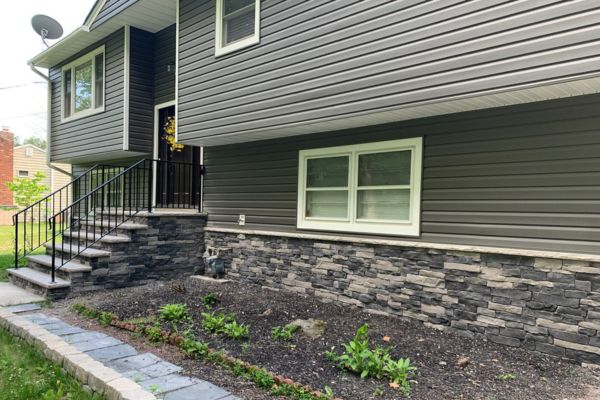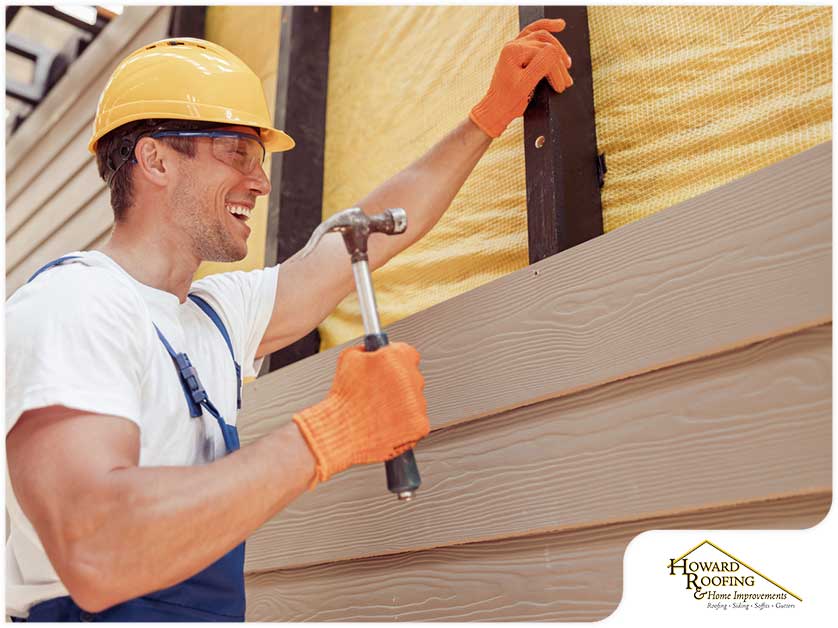Reliable Morris Siding Contractor Specializing in Residential Siding Projects
Reliable Morris Siding Contractor Specializing in Residential Siding Projects
Blog Article
The Necessary Guide to the Various Types of House Siding and Their Distinct Advantages
In the world of home enhancement, choosing the best siding is an important decision that impacts both visual allure and functional performance. With so several alternatives to take into consideration, which siding material absolutely stands out for your details project?
Timber Exterior Siding
Timber home siding, a prominent choice for property outsides, provides an ageless visual that integrates natural beauty with architectural honesty. This home siding material is available in different styles, consisting of clapboard, shingles, and board-and-batten, permitting property owners to customize their appearance to match their style choices. Wood exterior siding is normally crafted from resilient species such as cedar, redwood, or want, which are understood for their strength and capacity to hold up against ecological stressors.
One of the key advantages of timber exterior siding is its superb insulation properties, which can add to energy efficiency and reduced heating costs. In addition, wood exterior siding is biodegradable, making it an ecologically pleasant option when sourced sustainably. Routine maintenance, including paint or staining, can prolong its lifespan and enhance its look, permitting homeowners to protect the all-natural charm of the timber.
Nevertheless, potential disadvantages consist of sensitivity to insects, rot, and weather damage, necessitating appropriate treatment and maintenance - morris siding contractor. Regardless of these concerns, when appropriately taken care of, wood home siding can provide a stunning and sturdy remedy that enhances the character of a home while offering a warm, welcoming ambience

Plastic Home Siding
Plastic home siding has become a leading selection for house owners looking for a low-maintenance outside option that combines durability and cost. This flexible material is crafted from polyvinyl chloride (PVC), making it resistant to different weather, consisting of wetness and UV rays. As a result, vinyl siding does not warp, rot, or discolor, making sure durable visual charm.
One of the main benefits of vinyl home siding is its substantial series of colors and designs, permitting home owners to attain the wanted try to find their home without the need for constant repainting. In addition, plastic house siding is very easy to set up, which can substantially decrease labor expenses throughout construction or remodelling tasks.
Vinyl home siding also adds to power efficiency. Several choices feature insulation support, which boosts thermal efficiency, aiding to keep comfortable interior temperature levels and possibly reducing power costs. Additionally, its smooth surface area helps with very easy cleaning, requiring only periodic cleaning with a yard pipe to eliminate dust and debris.
Fiber Cement Exterior Siding
Fiber cement home siding has obtained traction among house owners and contractors alike because of its remarkable combination of resilience and visual versatility. Composed of a mix of cellulose, sand, and concrete fibers, this siding alternative is crafted to stand up to severe climate condition, including high winds, heavy rainfall, and temperature changes, making it a resilient selection for residential exteriors.

Among the main advantages of fiber concrete siding is its resistance to parasites, such as termites, and its non-combustible nature, offering boosted fire safety. morris siding contractor. Additionally, it is offered in a broad array of shades, structures, and styles, permitting homeowners to attain their preferred aesthetic without compromising performance
Another advantage is its reduced upkeep demands; fiber concrete house siding commonly calls for paint or staining every 5-10 years, which is less regular than various other materials. In addition, its durability adds to a reduced total cost of ownership, as it decreases the requirement for frequent repair work or substitutes.
Eventually, fiber cement house siding stands for an exceptional financial investment for those seeking a resilient, attractive, and versatile exterior option, incorporating both kind and feature to enhance the home's curb allure.
Steel Home Siding
The allure of steel house siding hinges on its durable hop over to these guys toughness and modern-day aesthetic charm, making it a popular option for contemporary style. Available in materials such as aluminum and steel, steel siding uses a variety of coatings and colors, permitting home owners to achieve a personalized appearance that matches their design vision.

Power effectiveness is another considerable advantage, as many steel house siding products are made with insulation options that help regulate indoor temperature levels. This can bring about reduced power prices gradually. In addition, steel siding is often recyclable, making it an ecologically pleasant selection for sustainability-minded house owners.
The installation procedure for steel home siding can be relatively straightforward, leading to a quicker turnaround time for construction tasks. Generally, steel home siding integrates performance and style, making it a practical choice for those looking for a visually appealing and enduring outside finish.
Block and Stone House Siding
Block and stone siding attracts attention as a timeless selection that enhances the aesthetic appeal of any kind of home. Understood for their sturdiness and low maintenance, these products offer a remarkable return on financial investment while raising the residential property's curb appeal. Readily available in various shades, textures, and patterns, block and rock can be customized to suit diverse building styles, from conventional to modern-day.
Among the key advantages of brick and stone home siding is their energy effectiveness. Both materials have natural insulating buildings that assist regulate interior temperatures, possibly decreasing heating & cooling costs. Furthermore, they provide premium fire resistance compared to various other siding options, find more contributing to enhanced safety.
Another advantage is their long life. Block and stone can last for years, commonly needing very little maintenance past periodic cleansing. Unlike timber house siding, they are resistant to parasites and rot, ensuring a long-lasting exterior that stands up to the aspects.
Conclusion
In summary, the selection of siding significantly affects a home's visual appeal, energy effectiveness, and maintenance demands. Each kind of house siding-- whether wood, plastic, fiber block, concrete, or metal and rock-- offers distinct benefits tailored to various homeowner choices and environmental conditions. Comprehending these alternatives allows notified choices that boost both the durability and aesthetic beauty of residential outsides. Eventually, choosing the best home siding is necessary for achieving a balance in between performance and design in property design.
One of the key advantages of timber siding is its outstanding insulation buildings, which can contribute to power effectiveness and reduced heating expenses. Furthermore, timber house siding is eco-friendly, making it an eco friendly choice when sourced sustainably.One of the key advantages of steel exterior siding is its resistance to various ecological variables.Power performance is an additional substantial benefit, as lots of steel exterior siding items are designed with insulation alternatives that help control indoor temperatures. Each kind of house siding-- whether timber, plastic, fiber steel, concrete, or brick and rock-- provides distinct advantages customized to numerous home owner preferences and environmental conditions.
Report this page